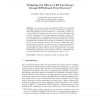Free Online Productivity Tools
i2Speak
i2Symbol
i2OCR
iTex2Img
iWeb2Print
iWeb2Shot
i2Type
iPdf2Split
iPdf2Merge
i2Bopomofo
i2Arabic
i2Style
i2Image
i2PDF
iLatex2Rtf
Sci2ools
112
click to vote
EWSN
2010
Springer
2010
Springer
Mitigating the Effects of RF Interference through RSSI-Based Error Recovery
On a common sensor node platform (Telos) we sample RSSI with high frequency during packet reception. We find that a packet collision (RF interference) often manifests as a measurable, temporal increase in RSSI. We investigate how the receiver can use this information to detect interference and, through temporal correlation, estimate the bit error positions in a corrupted packet. In an experimental study in two testbeds and several realistic BAN scenarios we show that a simple threshold-based algorithm often succeeds in estimating a large fraction of the bit error positions correctly. We develop an ARQ scheme that utilizes the error estimates to reduce the size of retransmitted packets. For this ARQ scheme we present an analytical model and verify it experimentally. Our results indicate that in comparison with a standard Send-and-Wait ARQ the expected number of bits per transmission can be reduced significantly (in our measurements by up to 14.7 %). Key words: Interference Mitigation; P...
| Added | 02 Sep 2010 |
| Updated | 02 Sep 2010 |
| Type | Conference |
| Year | 2010 |
| Where | EWSN |
| Authors | Jan-Hinrich Hauer, Andreas Willig, Adam Wolisz |
Comments (0)

